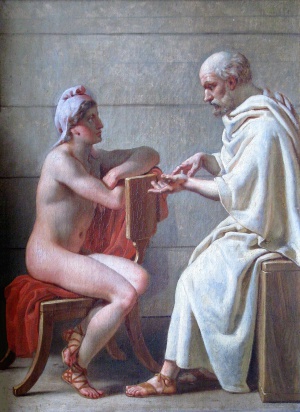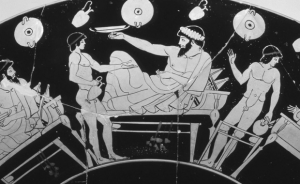(Boylove Documentary Sourcebook) - On the Apologetic Element of the Portrayal of Socrates as an Advocate of Chaste Pederasty in the Philosophical Works by Xenophon: Difference between revisions
Created page with "thumb|center|<i>[[Socrates and Alcibiades</i> (ca. 1813–1816) by Christoffer Wilhelm Ecker..." |
m Dandelion moved page (Boylove Documentary Sourcebook) - On the Apologetic Element of the Portrayal of Socrates as an Advocate of Chaste Pederasty in the Works by Xenophon to (Boylove Documentary Sourcebook) - On the Apologetic Element of the Portrayal of Socrates as an Advocate of Chaste Pederasty in the Philosophical Works by Xenophon |
(No difference)
| |
Latest revision as of 04:19, 15 October 2021

From "Xenophon's Symposium" by Gabriel Danzig, in The Cambridge Companion to Xenophon, edited by Michael A. Flower (Cambridge: Cambridge University Press, 2017). Footnotes omitted.
In Xenophon’s view, the belief that Socrates had sexual relations with the young is part of what underlay the charge of corruption of the youth. The sexual nature of the charge is made clear in Socrates’ conversation with the Syracusan (4.52–4), where the term diaphtheirein (to corrupt) describes the effects of sexual relations with the beautiful young performer. Xenophon regularly defends Socrates as the most enkrates of men (e.g. Mem. 1.2.1) and his Socrates advocates complete abstention in regard to young men (see Mem. 1.3.8–13, 2.6.32). Did Socrates himself follow this strict advice, confining himself to necessary relations (Mem. 1.3.14) with his difficult wife (Smp. 2.10)? Or is this an extreme portrait motivated by apologetic and educational concerns? Where does Xenophon himself stand on this vital question?
In a rare personal appearance in Memorabilia (1.3) Socrates speaks to Xenophon in the presence of Critobulus, claiming that Critobulus has acted foolishly and dangerously. When Xenophon learns that he did this by kissing Alcibiades’ son Cleinias he fails to condemn the young man, but rather says that he too would very much like to kiss a beautiful young man! This remark echoes the humorous but serious comments of Apollo and Hermes, who express a willingness to suffer humiliation for an opportunity to lie with Aphrodite (Odyssey 8.256–366). In response, Socrates blows his top, insulting Xenophon, warning him to stay away from young beauties, and telling Critobulus to spend a year abroad, away from Cleinias (1.3.11–13). This is not the only place where Socrates berates Xenophon. In their only other meeting, in Anabasis (3.1), Socrates criticizes Xenophon for misconstruing his advice and pursuing a military adventure in Persia. Both of these cases are often interpreted as tributes to Socrates’ excellent advice and expressions of Xenophon’s own contrition (see Gray 1998: 98–9; Flower 2012: 123–4). A recent study has argued that in Memorabilia Xenophon is expressing a serious disagreement with Socrates on erotic matters and that he takes a more lenient attitude than Socrates concerning erotic contact with young men.
There is a third possibility: Xenophon and Socrates may not be as far apart as they seem. I will not argue that Xenophon was as strict as Socrates, but rather that Xenophon’s Socrates is not as strict as he sometimes pretends. Critobulus has implied that Socrates used his wisdom as a means of getting kisses from beautiful young boys (4.18). Hermogenes has raised the charge of corrupting the youth in an even more explicit manner, blaming Socrates for Critobulus’ wild infatuation with Cleinias (4.23). Socrates does not deny Critobulus’ bad state or his own role as mentor, but offers excuses. Critobulus was already like this before he met Socrates; Critobulus’ father deposited him with Socrates in hopes of seeing an improvement; some small, infinitesimal, improvement has occurred: while previously Critobulus stared at Cleinias without blinking, now he blinks (4.23–4). And then Socrates readily admits that things have gotten worse and that Critobulus may have actually kissed Cleinias, a very serious and dangerous transgression (4.25–6). This is the same kiss that was discussed in Memorabilia (1.3). Charmides takes the charge one step further, accusing Socrates of enjoying the kind of erotic contact he warns others to avoid:
Why in the world, Socrates, do you frighten us, your friends, away from the beautiful like this? I saw you yourself, by Apollo, at the schoolmaster’s house, the two of you looking for something in the same book, with your head touching Critobulus’ head and your bare shoulder touching his bare shoulder! (4.27)
Rubbing shoulders may be a euphemism for sexual relations. It is certainly a violation of Socrates’ strict principles. Socrates does not deny this charge: he exclaims that this must be why he suffers from a pain in his shoulder and a sting in his heart, and admonishes Critobulus to stay away from him until he has hair on his chin (4.28). Later, in another contradiction to his frequent warnings, Socrates insists that the reward for victory in the beauty contest be kisses from the beautiful young entertainers, and not mere ribbons (5.9).
How are we to interpret Socrates’ confession of personal guilt and educational disability? What kind of mentor cannot trust himself with his own charge? Most likely we do not need to take his words literally. As Huss has argued, Charmides played along with Socrates’ gag earlier in the evening when Socrates claimed (falsely) that Charmides caught him dancing alone (2.17; Huss 1999b). Here Socrates returns the favor, playing along with Charmides’ claim that he caught him rubbing shoulders with Critobulus. His reaction shows that this is another gag: did he really not notice the supposed pain in his shoulder until now? But even if this never happened, it still contributes to the image of Socrates as indulgent of erotic misbehavior. Why, then, does Xenophon create such a portrait?
Part of the explanation is that Xenophon is engaged in a complex form of apologetics, responding not only to charges of misbehavior, but also to the charge that Socrates led a sad and joyless life (see Mem. 1.6.1–10). In the context of a drinking party, he prefers to highlight Socrates’ pleasurable contact with beautiful young men, even if this contradicts his more prevalent apologetic tendency. Xenophon does not tell us whether Socrates really violates these principles – his superior moral character enabling him to do so with impunity (see Mem. 1.3.14–15) – or not. What we do see, however, is a resemblance between the portrait of Socrates and the portrait of Xenophon himself. Just like Xenophon, Socrates treats erotic temptations with humorous indulgence when the occasion warrants. The invocation of Apollo in the Symposium passage cited above is a sign that the same Homeric passage is on Xenophon’s mind. However we understand Socrates’ actual behavior, the resemblance to Xenophon is palpable: far from breaking with the master, on this point Xenophon seems to be his best student and ablest imitator.

See also
- Adult friend (dictionary)
- Age of attraction (dictionary)
- Athenian pederasty
- Boylove
- Cretan pederasty
- Ephebophilia
- Erastes
- Eromenos
- Greek love
- Historical boylove relationships in ancient Greece
- Loved boy (dictionary)
- Minor-attracted person (dictionary)
- Pedophilia
- Philosophy of ancient Greek pederasty
- Spartan pederasty
- Theban pederasty
- Young friend (dictionary)